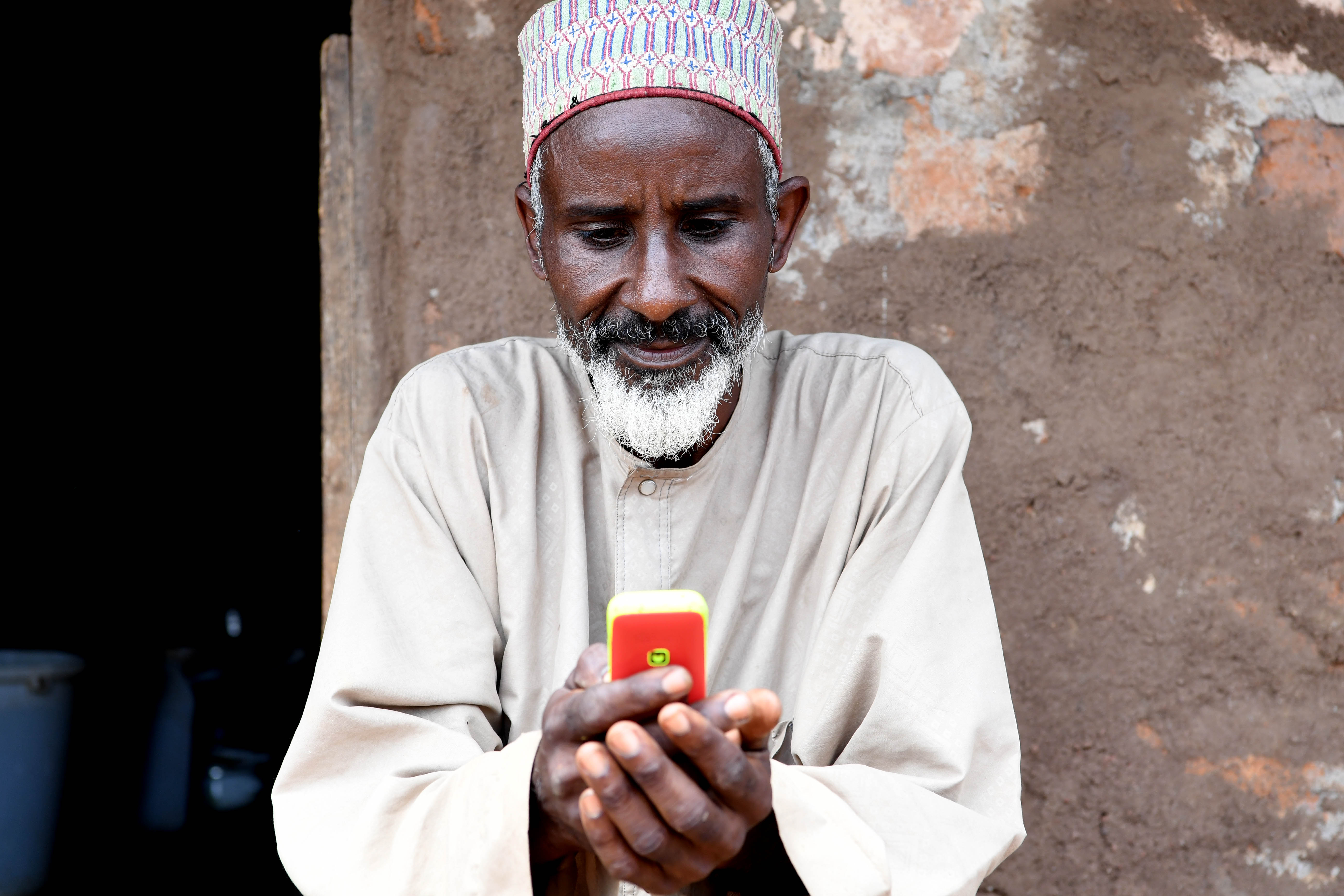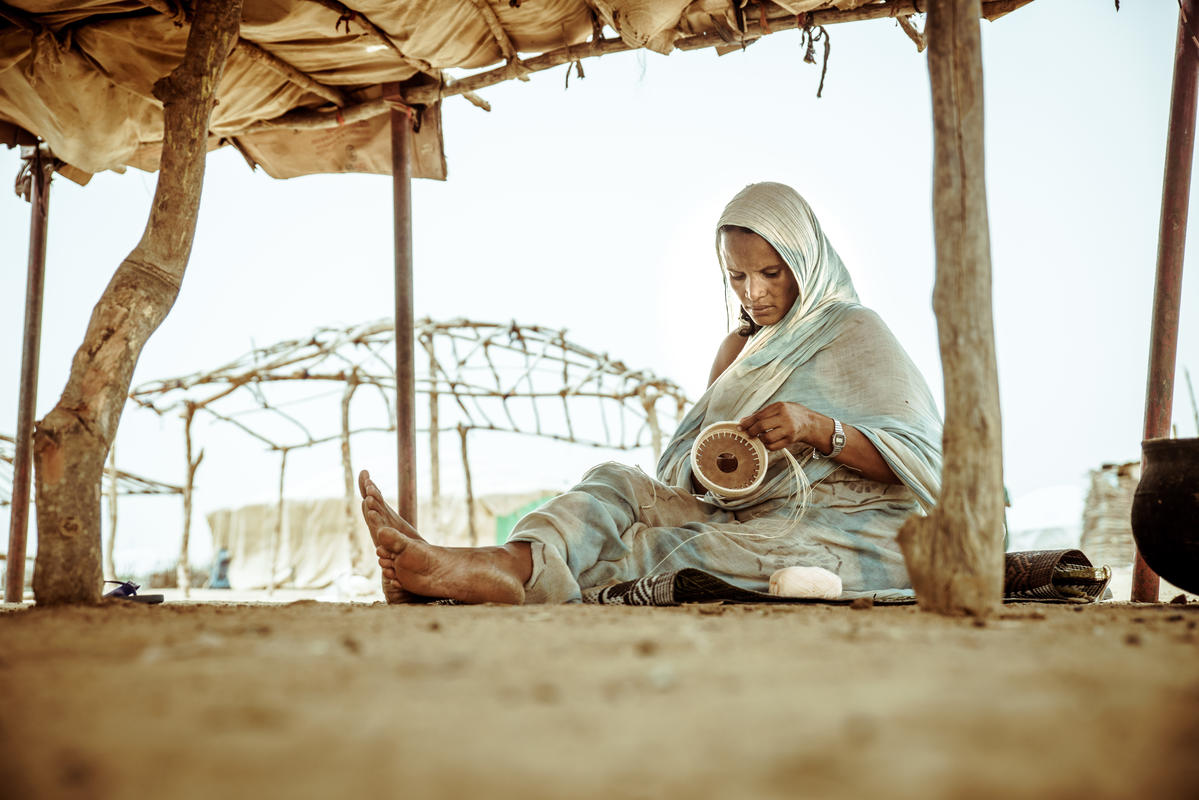In eastern Cameroon, refugees integrate society through its economy
In eastern Cameroon, refugees integrate society through its economy

As security conditions in Central African Republic have not abated, burying any hopes for return in the near future, refugees are shedding their dependence on continuously decreasing humanitarian aid
Cameroon hosts close to 350,000 refugees who had fled violence in Nigeria and the Central African Republic (CAR). About 250,000 Central Africans are settled in the country since 2014; most are hosted by local populations. Four years after the emergency began, security conditions in the CAR have not abated, burying any hopes for return in the near future. For these populations, shedding their dependence on continuously decreasing humanitarian aid is paramount.
Startled birds fly away in a rush as Baba and Abo make their way through the dense, humid forest, dead leaves cracking under their footsteps. The forest resounds with their laughter which pierces ambient birdsong. To get this far, they have driven and walked a considerable distance through the forest. In front of them stands a fence made of dead branches, which delimits their land. Each tree that grows across this isolated, 8 hectare plot of land holds the promise of a prosperous future.

Baba and Abo’s story is unusual. Almost 20 years ago, Abo, a Cameroonian national, met Baba in the locality of Nola, in south-eastern CAR, where he was presiding as the mayor. At the time, before war had devastated the region and forced Baba to flee, both men worked in the diamond mining industry.
“Life was beautiful for me then, but when conflict broke out between the anti-balaka and Séléka militia, I was decided not to fight. In 2014, we fled with 10 of my children by motorbike, leaving almost everything behind. Thankfully, when we arrived at the Cameroonian border, my friend Abo was there to greet us”, recalls Baba.
Like hundreds of thousands of other Central African refugees, Baba lost everything when he fled, but he kept his entrepreneurial mettle. It’s hard to imagine what could stop him from rebuilding his life here, where he was welcomed with such generosity. Baba and Abo have, with the help of their cooperative, which regroups 13 Cameroonian and Central African associates, set up a chicken coop, a small stock-breeding site and even a grocery store in the small village of Nyabodan, which is close to Yokadouma, a town that borders the CAR where more than 5,000 people live, including 1,200 refugees.
Those fleeing CAR’s war have been arriving continuously into eastern Cameroon since 2014 and most have been living with host communities.

Although the newly acquired land is not yet ready for use, it is easy to appreciate the opportunities offered by this environment. Everything can grow here, including bananas, pineapples, chili, papaya and corn. All that is missing is human intervention. By the sweat of their brow, both men have already established a small camp site,which is guarded by an eager and zealous puppy. “This will be beautiful” marvels Abo as he picks a ripe papaya.
This venture started from almost nothing : 500 chicks acquired thanks to financing from the FAO, which lead to the founding of the cooperative, which is supported by UNHCR, the UN Refugee Agency, and its partners, such as Catholic Relief Services (CRS).
Towards self-sufficiency
Further north, five or six hours from here, knee deep in mud, Bakara works with determined constancy. One after the other, his feet sink into the wet mud he knead under the baking sun.
Bakara is a 32 year old father of five, and a refugee from Berberati in the CAR; he works relentlessly in difficult conditions. Bakara was previously a butcher who transitioned into to a more lucrative activity. The man’s body is shaped by this hard labour and he has earned a good reputation at the Lolo refugee site, in eastern Cameroon.

The fruit of his work is visible across the site, where emergency shelters that were initially constructed using tarpaulins, are gradually being converted to more durable dwellings, made from terracotta bricks.
Alongside 250,000 of his compatriots who fled violence in the CAR, it is in this peaceful region of Cameroon that he sought refuge, as did his neighbour Aladji, another entrepreneur and refugee, who is intent on regaining the estate war has taken from him.
“In Dinguiri, I was a farmer and I owned a hundred houses. When I was forced to flee, I left with less than 300 Francs CFA. I lost everything”, he says smiling, surrounded by two of his 13 children.
Once he had crossed the border, the farmer didn’t spare a moment: “I was lucky because my Cameroonian brothers put their trust in me and gave me 32 hectares of land to work on. Three days after seeking refuge, I was already working”.
Aladji exhibits his small hangar with pride, where tens of large bags sit, full to the brim with corn. Some of these are even going to be sent to Yaoundé, Cameroon’s capital.
In his host community, where he now employs 24 people, 9 of whom are Cameroonian, there is no doubt among the inhabitants that vouching for him was the right thing to do. This adventure is far from being over: he is currently looking to purchase tractors, which will enable him to expand his activities.

The economy as a driving force behind coexistence
For UNHCR’s partner CRS, one of whom’s main activities consists in fostering social cohesion and appeasing conflicts between host communities and refugees, this story is seen as a victory.
The NGO has committed itself to establishing numerous conflict management mechanisms : “We have observed a considerable decrease in the number of conflicts between both populations over the past year, even if friction still occurs owing to an insufficient number of water points”, explains Joele Kwembi, a project assistant at CRS.
Similarly for the two partners of Yokadouma, their business is first and foremost a model for social cohesion. In fact, the town’s ex-notary lends his services to the community. As president of the refugee committee, he regularly hosts discussions with men, women, youths and children to assess the situation, resolve conflicts and ensure refugees, host populations and refugees live together in harmony.
This is frequently a fear felt by local populations. If they are the first responders, the arrival of a great number of refugees with nothing in their possession can always become a source of conflict: “Previously, there was a lack of trust between us. Local populations worried we were here to disrupt their lives. Little by little, this problem went away thanks to cohesion efforts”, explains a 40 year old mother during one of these reunions. “Now we can even work together”, says another in a cheerful tone, before Baba concludes by saying “and even find love?” causing all the participants laugh.
Among those best placed to testify to this is 25 year old Moussa. This young man from Berberati arrived on his own in 2014. Dressed in a Cameroonian football jersey which depicts the “Lions indomptables“, the Untameable Lions of the national team, he timidly evokes the day he first met 21 year old Alima, who is sat next to him. Having met on the side of the road that leads to Mbilé, where they now live, after marrying according to the custom.
Alima is even shyer than her young husband. She wears a vividly coloured dress and a delicate pink veil, holding on her knees Mancia Oumi, the couple’s infant daughter.
Nevertheless, life isn’t easy for this couple, who depend entirely on humanitarian aid and who have very few resources. Despite success stories that exist across the various refugee sites, most of the population – mostly youths – remains idle.
Towards autonomy
The challenge of making refugees self-sustainable is key among those facing humanitarian actors and the Cameroonian Government : as conditions in the CAR are not yet conducive for refugees to return, emergency operations make way for projects aiming to ensure affected populations become autonomous. The latter seek work or training wherever they can find it. To address these needs, NGOs such as CRS provide training in the following areas, among others: hair dressing, sewing, driving and mechanics.
However, the amount of funding available is decreasing, especially in so far as food aid is concerned where there were additional cuts in early 2017: four years after the first wave of the emergency, standard food rations have been cut by half and the number of beneficiaries has as well.
According to Johannes Zech, in charge of transitioning from humanitarian to development activities at UNHCR, “further reductions in humanitarian aid will contribute to fragilizing reception zones in Cameroon and worsening already existing vulnerabilities of local populations and refugees. This is why UNHCR and the World Bank are developing a plan to support the State’s basic ability to provide basic services, in order for it to be able to assist all populations without prioritizing one group over another” he says. “This plan falls within a global approach that seeks to facilitate the transition between humanitarian response and development by reinforcing pre-existing public structures and enabling the socio-economic inclusion of refugees”.
The goal is to progressively replace aid provided to refugees with support for municipalities, enabling them to assist the entire population of refugees and Cameroonian citizens alike. Those regions of Cameroon hosting refugees are also the poorest in the country, and their populations are as vulnerable as the refugees are. For Johannes Zech, “by supporting the State to help provide equal services to all and assisting Baba, Abo and Bakara in their work, UNHCR and humanitarian actors hope to contribute to equalizing the playing field and transforming this crisis into an opportunity for all”.
(translated & edited by Ulysses Grant)








